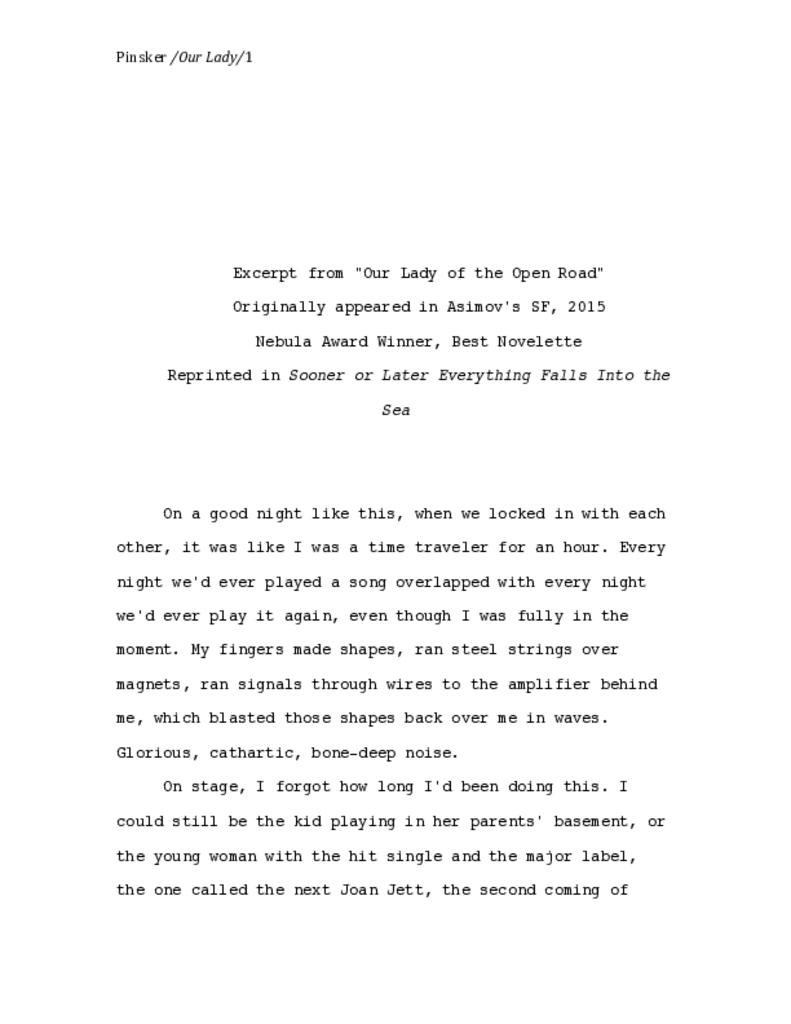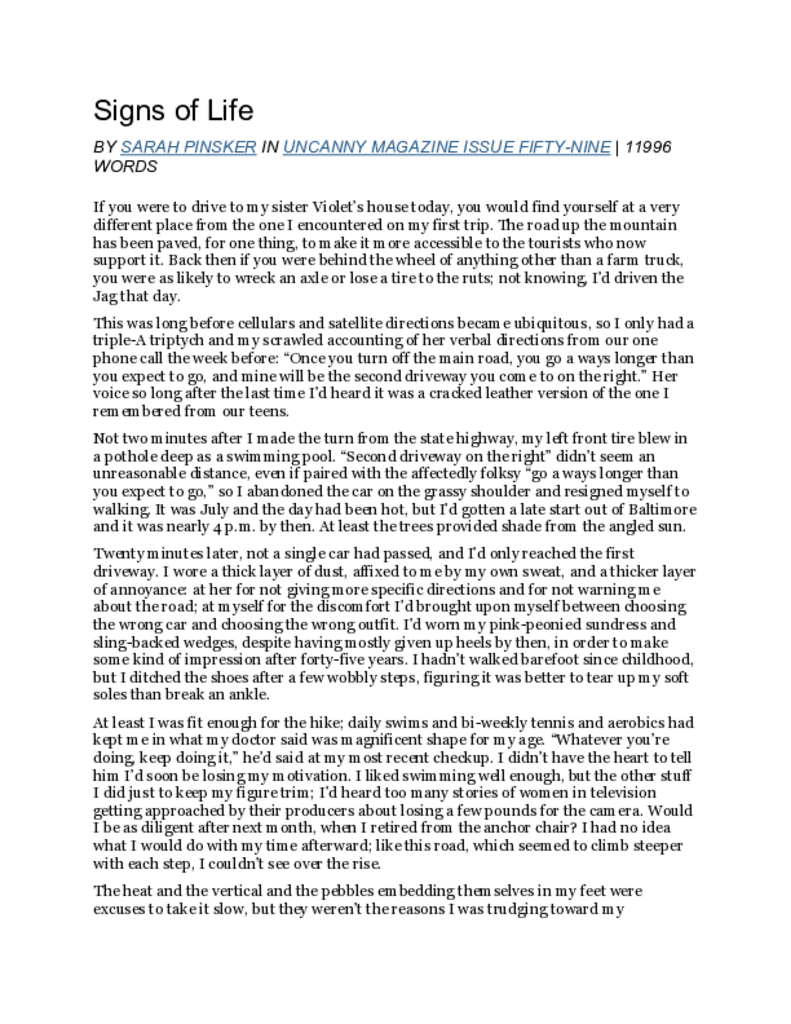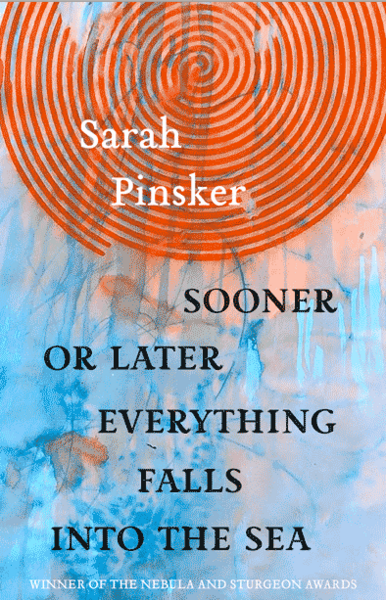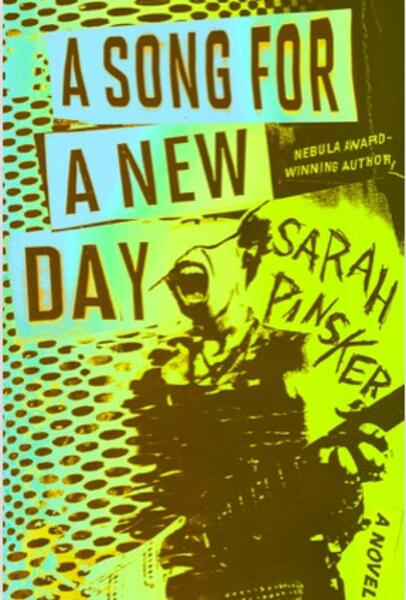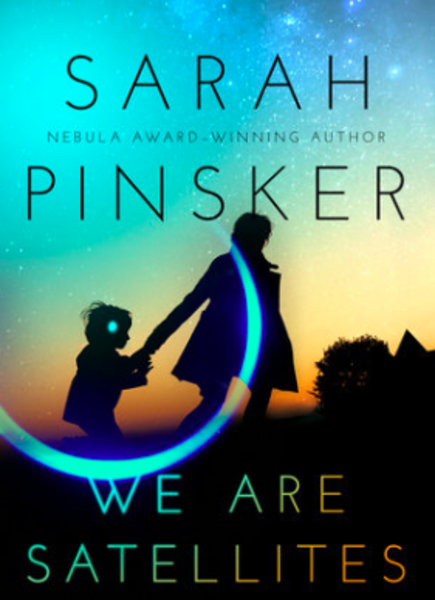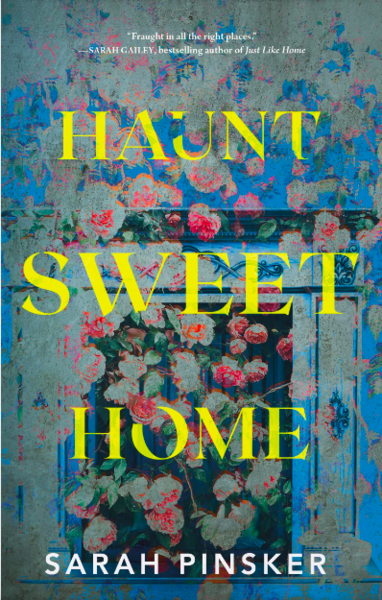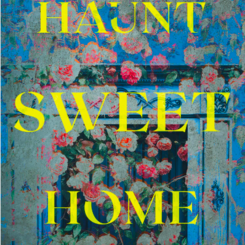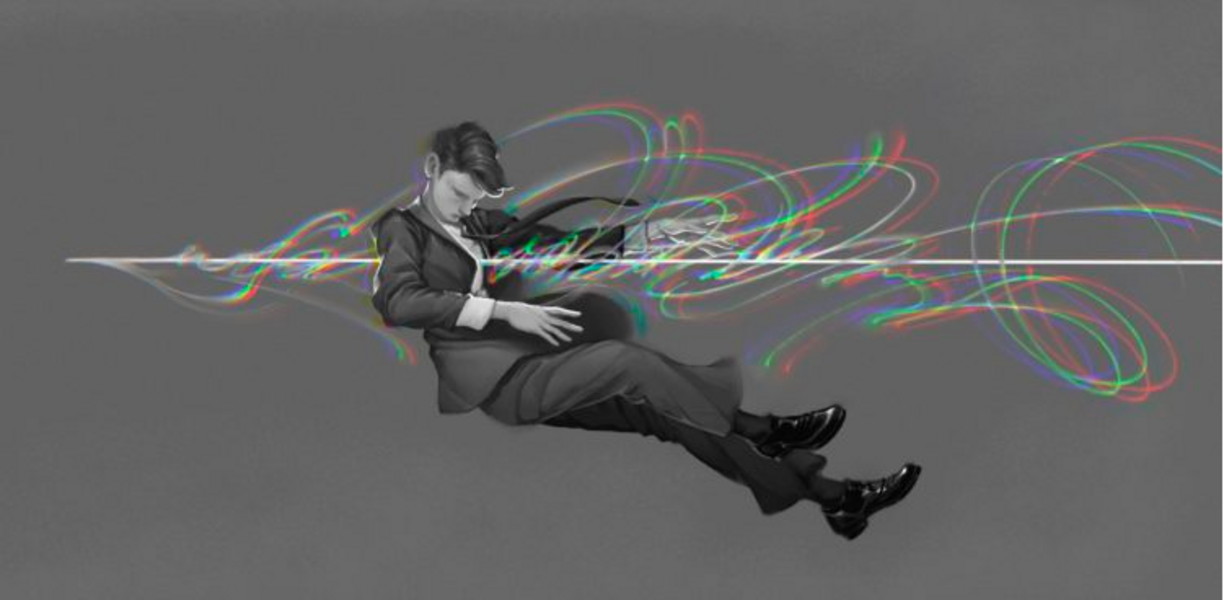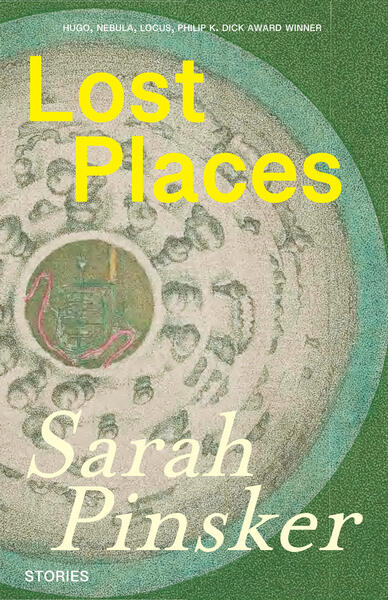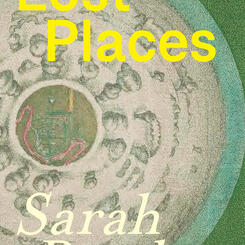Work samples
-
Excerpt from novelette "Signs of Life"
Excerpt from 2024 novelette "Signs of Life," published in Uncanny Magazine. You can read the rest at this link.
About Sarah
Sarah Pinsker writes literary speculative fiction. Her Philip K Dick Award-winning first collection, Sooner or Later Everything Falls Into the Sea, was published by Small Beer Press in 2019, and her Nebula Award-winning first novel, A Song For A New Day, was published that same year by Penguin Random House; the latter has since become renowned for its prescient depiction of a pandemic's effect on live music. Her most recent book is the 2024 novella Haunt Sweet Home. … more
Sooner or Later Everything Falls Into the Sea
Winner of the Philip K. Dick Award
Finalist for the World Fantasy Award
Milwaukee Journal Sentinel Best Books of 2019
Booklist: Top 10 Debut SF&F
The baker’s dozen stories gathered here (including a new, previously unpublished story) turn readers into travelers to the past, the future, and explorers of the weirder points of the present. The journey is the thing as Pinsker weaves music, memory, technology, history, mystery, love, loss, and even multiple selves on generation ships and cruise ships, on highways and high seas, in murder houses and treehouses. They feature runaways, fiddle-playing astronauts, and retired time travelers; they are weird, wired, hopeful, haunting, and deeply human.
Advance Praise
“This collection of stories is simply wonderful. Each story is generous and original; as a collection, the tales are varied, but with recurring themes of memory and music through-out. Pinsker has emerged as one of our most exciting voices and I’m glad to note that I’m not the only one who thinks so. I love this book completely.”
— Karen Joy Fowler, author of We Are All Completely Besides Ourselves
“A collection of virtuosic range, imagination, and subtlety. Sarah Pinsker’s mastery works at a deep level, eschewing showy displays or baroque prose. Many of the stories are set in a dystopic, all-too-believable future not far removed from our own, with a tone and focus reminiscent of Alice Munro.”
— Ilana C. Myer, author of Last Song Before Night
“Sarah Pinsker plays genre like a favorite guitar, and I am in awe of her talents. How can a writer so new be so central, so necessary? High-concept and humane, timely and timeless, these stories are 21st-century classics.”
— Andy Duncan, author of An Agent of Utopia
Reviews
“Compelling science fiction and fantasy.”
— Des Moines Register
“Sarah Pinsker’s debut short story collection is speculative and strange, exploring such wide-ranging scenarios as a young man receiving a prosthetic arm with its own sense of identity, a family welcoming an AI replicate of their late Bubbe into their home, or an 18th century seaport town trying to survive a visit by a pair of sirens — all while connecting them in a book that feels cohesive. The stories are insightful, funny, and imaginative, diving into the ways humans might invite technology into their relationships.”
— Arianna Rebolini, BuzzFeed
“This was my first time reading Pinsker, and she BLEW MY MIND. . . . These 13 stories are wildly original and, frankly, jaw-dropping. A man’s new prosthetic arm dreams that it is a road in Colorado; the dream children of childless parents sun themselves on the rocks like seals; a rock star washes up on an island, where she is rescued by a recluse. So. Many. Amazing. Stories. My favorite might be the last story, in which a bunch of Sarah Pinskers attend a writer’s conference, where one of them is murdered. Every story was unlike anything I had read before, as well as smart and fun, which is everything I want from a story collection. RUN, DON’T WALK.”
—Liberty Hardy, Bookriot
“Sooner or Later Everything Falls Into the Sea cannot be recommended enough for fans of LGBT+ sci-fi and fantasy. Pinsker’s collection has such a range and depth to it storytelling and emotional resonance that the reader will be left in complete awe after reading any chosen story. Pinsker’s collection invites the reader to truly imagine and be taken by her stories, and to see that, while the future may be full of frightening, there’s still a humanness that can be found in any corner of the universe or multiverse, and that by exploring as much as we can, there’s a way to end the journey more in tune with the space around them.”
— Alexander Carrigan, Lambda Literary
“Sooner or Later Everything Falls Into the Sea is a collection where societal boundaries are both porous and rigid. To an extent, Pinsker is arguing that it’s those who exist outside of clearly designed roles are also the most perceptive about the flaws and mysteries of a given society, whether it’s a longstanding one or a temporary one that will dissipate after a certain event takes place. But, as is the case in “Our Lady of the Open Road,” she also notes that societies and cultures can often overlap, and an outsider in one society might well be an insider in another. Throughout the book, Pinsker demonstrates a virtuosity in creating lived-in worlds, but her real talent on display here is finding the ambiguous and liminal spaces within those worlds. There are no easy answers in these stories, but the questions Pinsker raises can be just as satisfying.”
— Tobias Carroll, Tor.com
“Jawdropping.” — Liberty Hardy, Bookriot
“Sooner or Later Everything Falls Into the Sea is Pinsker’s first collection. It’s a book that every SF reader needs to own. . . . Her impact on the field, already considerable, is only just beginning.” — Don Sakers, Analog SF&F
“One of the year’s most anticipated collections is even better than advertised.” — Joe Sherry, Nerds of a Feather
“Pinsker’s style is clean and intimate, rich with emotion, but not a single unearned sentiment. Her characters are lovable portraits of self-frustration: good, flawed people confronted with too much loss and liking none of their options, with a talent for creative destruction.” — Theodore McCombs, Fiction Unbound
“Sarah Pinsker’s stories nestle in the cracks of our world with strange concepts that resound emotionally with the reader.” — Sara Ramey, The Arkansas International
“The 13 stories collected here vary in length, from the almost-micro-fiction of ‘The Sewell Home for the Temporarily Displaced,’ to the novella-length ‘And Then There Were (n-1),’ a nominee for both the Hugo and Nebula last year that posits what might happen if an author (Sarah Pinsker) attended a convention for her alternate selves from alternate dimensions, and then one of them started murdering the others. The collection is worth the cover price for that story alone, to be honest; that there are a dozen others, including the moving ‘In Joy, Knowing the Abyss Behind,’ which deals with a woman’s grief at the loss she feels after her husband’s stroke leaves him unable to talk (also a Nebula finalist), is frankly more than we deserve.” — Jeff Somers, B&N, The Best SF&F of March
“A must-have first collection.” — Rich Horton, Locus
“Like all innovative short fiction writers, and despite her recurrent concerns with memory and music, Pinsker’s cardinal strength lies in her unpredictability. This may be one reason why she opens her collection with two stories unlike any others in their surreality. In ‘A Stretch of Highway Two Lanes Wide’ a Canadian farm boy whose arm has been ripped off by a combine is fitted with a high-tech prototype prosthetic, which inexplicably feeds back to him the impression that he’s on a remote Colorado highway – or may be a remote Colorado highway. The second story, ‘And We Were Left Darkling’, may borrow a bit of its hallucinatory group obsession from Close Encounters of the Third Kind, but the disparate group of dreamers here are drawn to a remote beach in California, where their might-have-been dream babies appear by the hundreds out of the surf. It’s an absurdist conceit, but Pinsker’s lovely, elegiac narrative voice makes it oddly convincing. As with so many of the stories here, it’s a voice resonant with feeling and desire. Maybe it’s the voice of a singer. ”
— Gary K. Wolfe, Locus
“Her first collection showcases a talent that resonates with classic grandmasters of the past — folks like Bradbury, Ellison, and Sturgeon — and also vibrates to contemporary forces, such as Karen Russell, Jonathan Lethem, and Kelly Link. This generous assemblage from Small Beer stands out as one of the best debuts in recent years, and should serve to introduce her to a wider audience than just those folks who fervently follow the genre magazines.”
— Paul Di Filippo, Locus
“Pinsker’s stories have murder houses that speak, dream children that emerge from the sea, and a car shaped like a narwal, but the heart of this debut collection lies in its people. The women protagonists, many of whom love women, are adapting to or resisting new ways of life: a punk musician insists on playing live and driving manually while her world depends on recorded immersive experiences and self-driving cars; a girl adjusts to a robotic grandmother as she and her father leave their home country; in ‘Wind Will Rove,’ a community that left Earth long ago asks why it still holds on so tightly to Earth’s history and art and whether it should let go of it entirely in order to embrace the new. A particular highlight is ‘In Joy, Knowing the Abyss Behind,’ a story primarily about Millie’s impeding loss of her husband, where the sf gem at its core takes a backseat to the tree house George built with his children and to the question of whether he did his best to make the world a better place. This collection from an exciting new voice in speculative fiction is both haunting and hopeful.” — Booklist (starred review)
“This beautiful, complex debut collection assembles some of Nebula winner Pinsker’s best stories into a twisting journey that is by turns wild, melancholic, and unsettling. In the opening story, an injured farmer adjusts to living with a cybernetic arm that thinks it is a stretch of road in Colorado. ‘In Joy, Knowing the Abyss Behind’ tells the story of a woman piecing together her husband’s enigmatic past after a stroke leaves him speechless. ‘No Lonely Seafarer’ pits a stablehand against a pair of sirens as he attempts to save his town from its restless sailors. In all of Pinsker’s tales, humans grapple with their relationships to technology, the supernatural, and one another. Some, such as Ms. Clay in ‘Wind Will Rove,’ are trying to navigate the space between technology as preservation and technology as destruction. Others, such as Kima in ‘Remembery Day,’ rely on technology to live their lives. The stories are enhanced by a diverse cast of LGBTQ and nonwhite characters. Pinsker’s captivating compendium reveals stories that are as delightful and surprising to pore through as they are introspective and elegiac.” — Publishers Weekly (starred review)
“In her debut collection, widely lauded author/musician Pinsker zips through road trips, space ships, speculative futures, and parallel presents with stories that are equal parts hard-wired sci-fi theory and hard-traveling rock-and-roll attitude. The 13 short stories that make up this collection range from near novella length—’Our Lady of the Open Road,’ ‘Wind Will Rove,’ and the phenomenal ‘And Then There Were (N-One)’—to the very brief—’The Sewell Home for the Temporally Displaced,’ which clocks in at a little under three pages. Their subject matter is equally diverse. In ‘A Stretch of Highway Two Lanes Wide,’ the main character’s mangled arm has been replaced with a ‘Brain-Computer Interface’ prosthetic which believes itself to be a road somewhere in Colorado; in ‘The Low Hum of Her,’ a family undertakes an Ellis Island-esque immigration accompanied by an AI mechanical replicate of their departed Bubbe hidden in the steamer trunk. With stories that jump from divergent pasts to possible futures and include main characters of all age ranges, genders, and social backgrounds, it would be easy for the book to become disjointed. However, Pinsker’s undeniable talent for familiarizing characters caught in deeply unfamiliar situations (a treehouse that hides an alien race’s architectural salvation; an 18th-century seaport town beset by sirens; folk musicians on a generational star ship whose destination they will not live to see) brings a uniting element of empathy to even the most far-fetched conceit. There are also similarities between the thematic preoccupations of the individual works. Pinsker’s characters are often loners dedicated to idiosyncratic artistic pursuits—like fiddling in space or building scale models of murder houses. They are stubborn adherents to codes of authenticity that their worlds have abandoned, and the stories’ plots tend to center around their revolts against conventional (or fantastical) social norms. Populated by anarchists, punks, survivalists, luddites, drifters, and rock-and-roll queers, Pinsker’s stories romp through their conceits with such winning charm that even the less successfully cohesive among them delight with their nuanced detail. In spite of being hampered slightly by a tendency to invest more in the worldbuilding than in the culmination of plot, Pinsker has delivered a sturdy collection in the speculative tradition of Ursula K. Le Guin or Kelly Link but with her own indomitable voice front and center. An auspicious start to what promises to be one wild ride of a literary career.” — Kirkus Reviews
“Yearning manifests itself into something tangible; it congeals, breathes, and breaks the barriers between dreams and reality. . . . Sooner or Later Everything Falls into the Sea is a collection whose musing visions none should try to resist.” — Foreword Reviews(starred review)
"We're only a handful of months into the new year, but I'm pretty sure that Sarah Pinsker's collection Sooner or Later Everything Falls Into the Sea will be the best book I read in 2019. If I'm wrong, I've got something really special to look forward to, because the quality of these stories is simply stellar...I love the sense of hope that permeates even the most hopeless of situations. I love the way the characters, their problems, and the settings they move through stay with me beyond the confines of the book's pages. I love every damn thing about these stories. When I got to the last page I was already looking forward to rereading them. —Charles de Lint, The Magazine of Fantasy and Science Fiction
A Song For A New Day
In the Before, when the government didn’t prohibit large public gatherings, Luce Cannon was on top of the world. One of her songs had just taken off and she was on her way to becoming a star. Now, in the After, terror attacks and deadly viruses have led the government to ban concerts, and Luce’s connection to the world–her music, her purpose–is closed off forever. She does what she has to do: she performs in illegal concerts to a small but passionate community, always evading the law.
Rosemary Laws barely remembers the Before times. She spends her days in Hoodspace, helping customers order all of their goods online for drone delivery–no physical contact with humans needed. By lucky chance, she finds a new job and a new calling: discover amazing musicians and bring their concerts to everyone via virtual reality. The only catch is that she’ll have to do something she’s never done before and go out in public. Find the illegal concerts and bring musicians into the limelight they deserve. But when she sees how the world could actually be, that won’t be enough.
Winner of the Nebula Award for Best Novel!
BLURBS AND REVIEWS
Publishers Weekly’s “Most Anticipated Books of Fall 2019”
NPR 2019 Book Concierge: Rock music and speculative fiction have a long history together – Emma Bull’s classic fantasy novel War for the Oaks springs to mind. But Sarah Pinsker has upped the volume with A Song for a New Day. The Nebula Award-winning author delivers a dystopian tale of political suppression, virtual reality and outlaw musicians that examines why we create and how vital that is in a world gone mad.
“An all-too plausible version of the apocalypse, rendered in such compelling prose that you won’t be able to put it down…a lively and hopeful look at how community and music and life goes on even in the middle of dark days and malevolent corporate shenanigans.”—Kelly Link, Pulitzer Prize finalist and author of Get In Trouble
"...Pinsker’s prose excels at capturing the vitality in Luce’s live performances, her lyrical style at times taking on incantatory cadences, as Luce describes “the elusive collision of a song, a performance, a moment; the agreement that I would try to reach them, and they’d open themselves up to being reached.” “Live songs have teeth,” she says later, “and teeth are messy things, tearing and rending and helping spit ideas into the world.” If rock is to survive the apocalypse, it couldn’t ask for a better prophet..." --Theodore McCombs, Fiction Unbound review of A Song For A New Day
“You’d better keep a copy of A Song for a New Day with you at all times, because this book will help you survive the future. Sarah Pinsker has written a wonderful epic about music, community, and rediscovering the things that make us human. Pinsker has an amazing ear for dialogue, a brilliant knack for describing music, and most importantly a profound awareness of silence, in both its positive and negative aspects. A Song for a New Day restored some of my faith in community, and I didn’t even realize how much I needed this book right now.” –Charlie Jane Anders, national bestselling author of All the Birds in the Sky and The City in the Middle of the Night
“Experiencing Sarah Pinsker’s A Song For a New Day is like listening to a fine, well-rehearsed song unleashed live. It’s a deeply human song of queer found family and the tension between independence and belonging, thoughtful and raw like the best live music. It’s also a cautionary tale of what happens when we privilege convenience over connection. If you love performance—the magic of head-thrown-back ecstatic musical communion—read this book.”—Nicola Griffith, author of Hild
“A compelling book about the importance of music–and any sort of art–in a world where it seems like the least essential thing. This is an expertly drawn post-catastrophe world peopled by compassionately written characters.”—Ann Leckie, Hugo Award winning author of Provenance
“Establishes [Pinsker] as an astonishingly impressive writer of day-after-tomorrow SF…This tale of hope and passion is a remarkable achievement.”—Publishers Weekly (starred review)
“A post-apocalyptic tale about the power of art and the urgency of human connection…cements Pinsker’s status as a rising star in the world of speculative fiction. A gorgeous novel that celebrates what can happen when one person raises her voice.”—Kirkus (starred review)
“Pinsker’s first novel is a riveting and plausible look into what our world could be if we become consumed with fear and dependent on social media. It is also a love letter to live music and underground shows, imagining futuristic musical innovations and the punk rebel scene that could emerge in response to a closed-off world.”—Booklist (starred review)
“Pinsker’s first novel depicts a moving alternate future in which technology provides everything a person could want, except human contact. Themes of virtual reality, humanity, and music are threaded throughout this melodic story.”—Library Journal (starred review)
“This is an amazing story about music, finding oneself and one’s purpose, while at the same time, touching on many of the issues that we are starting to see in everyday life, the addiction to devices, in particular. … The characters are strong and likeable, the descriptions of places where people play are vivid and detailed. A book I highly recommend!”—The Nerd Daily
“A Song For a New Day is amazing. Pinsker has one of the strongest voices for character in fiction today; everything her characters do is compelling. Pinsker accomplishes a scary look at a future and still gives us comfort within it. She helps us remember that the world isn’t over yet, after all.”—Mur Lafferty, author of Six Wakes
“Woven through Pinsker’s meticulously crafted future of technology-enabled isolation and corporate-consumerist powerlessness is a stirring anthem against the politics of fear. A dazzling tale told in multiple voices, with not a single note out of place. This is the lyrical protest song that we have always needed, perhaps more so now than ever.”–Ken Liu, author of The Grace of Kings
“Sarah Pinsker shares an unsparing vision of a near-future world only a few degrees removed from our own, but has the nerve and audacity to leaven the darkness with hope. A powerful novel whose unforgettable characters channel humanity’s true superpowers: art and the act of creation. “ — Elizabeth Hand, author of Curious Toy and Generation Loss
“A Song for a New Day is a compulsively readable story about music, freedom, taking chances, and living with your past. I meant to read it slowly, savoring Pinsker’s near-future world-building and her perfect descriptions of performance, but I ended up gulping it down, so eager to see what happens next for Luce and Rosemary, each brave and resourceful in her own way.”—Kij Johnson, author of The Dream-Quest of Vellitt Boe
“Sarah Pinsker plays genre like a favorite guitar, and I am in awe of her talents. How can a writer so new be so central, so necessary?”—Andy Duncan, author of An Agent of Utopia
“A full-throated call to arms in the service of music, creation, and shared experience, A Song for a New Day resists both extremes and easy tropes, offering hope in the face of catastrophe through the engrossing stories of characters you’ll want to spend more time with.”—Malka Older, author ofInfomancy
“Let freedom ring in the growl of an angry guitar chord! Sarah Pinsker’s A Song For a New Day is an absorbing tale of a quiet, all-too-believable American dystopia in which a passion for music becomes the secretive, surprising seed of rebellion.”—Linda Nagata, Nebula Award winning author of The Last Good Man
“A Song for a New Day is a must-read from a new voice you won’t forget.”–Sam J Miller, author of Blackfish City
We Are Satellites
We Are Satellites is a 2021 novel about two mothers, their two children, and the new technology that divides them. Set in a nameless Baltimore-like city, it asks questions about who gets left behind and who profits when a device becomes ubiquitous.
“Pinsker’s meticulous research and melodious prose bring readers to the heart of a family and the challenges of societal expectations, technology, and the desire to advance without fully understanding the consequences.”
—Library Journal (starred review)
Where Oaken Hearts Do Gather
The link to the story is https://uncannymagazine.com/article/where-oaken-hearts-do-gather/
The link to the song is https://www.youtube.com/watch?v=v_PrliX7XGA
Haunt Sweet Home
This 2024 novella is about a woman who takes a job on a reality show called Haunt Sweet Home, which combines a fixer-upper show with a ghost hunting show. Her task, she discovers, is to haunt the houses. This book was directly inspired by the applewood figure in the American Visionary Art Museum's permanent collection.
A Better Way of Saying
Link: https://www.tor.com/2021/11/10/a-better-way-of-saying/
Lost Places
Locus Award finalist · Slate: Best of the Year · Book Riot Best Fantasy Books of 2023
A half-remembered children’s TV show. A hotel that shouldn’t exist. A mysterious ballad. A living flag. A group of girls goes camping. Nebula and Hugo Award-winning author Sarah Pinsker’s second collection brings together a seemingly eclectic group of stories that unite behind certain themes: her touchstones of music and memory are joined by stories about secret subversions and hidden messages in art, lost routes, last chances. Her stories span and transcend genre labels, looking for the truth in strange situations from possible futures to impossible pasts.
Interview: JMMW
Read a story: Where Oaken Hearts Do Gather
Reviews
A Publishers Weekly Pick of the Week
“When it comes to keeping you guessing, Sarah Pinsker is no slouch. Her new collection, Lost Places, puts extremely memorable characters into bewildering situations. As that ‘lost’ in the title suggests, many of these stories involve people who’ve misplaced themselves: in the wilderness, in the fog of dementia, in strange circumstances. Pinsker’s characters always make the best of tricky situations, which only makes their struggles in her topsy-turvy worlds more heartbreaking.
Some the stories in Lost Places are unsettling: There are swimming holes that make people disappear, and a sinister version of Mister Rogers’ Neighborhood whose host tells stories that warp the fates of the children in his studio audience. But there are also stirring tales of rebellion, in which ordinary people escape from confinement, organize their neighbors to protest injustice and speak out against abuses.”
— Charlie Jane Anders, Washington Post
“Loss has infinite meanings in Sarah Pinsker’s second short fiction collection (after Sooner or Later Everything Falls Into the Sea), detailing characters’ escapes within and from eerie childhood TV shows (‘Two Truths and a Lie’), the modern liner notes of a song lyrics website (‘Where Oaken Hearts Do Gather’), and silent films (‘A Better Way of Saying’). Gathering wildly inventive speculative tales published everywhere from Uncanny to Strange Horizons to Tor.com, Lost Places also invites readers to immerse themselves in a brand-new story: ‘Science Facts!’, which recalls childhood Girl Scout trips where you were certain that there was something beyond spooky lurking in the woods.
— Natalie Zutter, Lithub
“Contagious enthusiasm for story.” — Gary K. Wolfe, Locus
“It’s a compelling vision, and one that feels distinctly of the moment, as entire species are forcibly disappeared and mass media juggernauts sling their own libraries into oblivion. But, though things look grim, there is still a desire for art, a need for community, and possibility for new experiences in this world of destruction and decay. For all the apposite fears and bleak predictions encoded in her work, Pinsker is producing some of the most enjoyable science fiction in the English-speaking world. . . . It absolutely soars.” — William Shaw, Strange Horizons
“Pinsker’s latest collection includes her Hugo Award–winning story ‘Where Oaken Hearts Do Gather,’ a folklore-esque mystery told through the annotations and comment chains of a song-lyrics website, and new story ‘Science Facts!’ in which a group of girls on an orienteering trip step into a forest that holds some eerie secrets. Pinsker is as prescient as ever, digging into the questions we’ve been asking ourselves over the past few years: What are we willing to sacrifice to be comfortable? What are the dangers of increasing digitization and gamification of everyday needs, or of even the best-intentioned surveillance? In ‘That Our Flag Was Still There,’ every day, a person must be a human flag, drugged with patriotism; in ‘Escape from Caring Seasons,’ a woman must escape a largely automated elder care community that is holding her wife prisoner. The stories are queer, hopeful, and eerie, celebrating the rebellious spirits of both immortal-feeling youth and resilient elder protagonists. These stories are inspired by the rhythms of jazz, the inspiration behind art, the power of speaking aloud. It’s a worthy follow-up to her first short story collection that fans of Charlie Jane Anders and Sarah Gailey will enjoy.”
—Leah von Essen, Booklist (starred review)
“This remarkable collection of 12 speculative shorts from Pinsker (Sooner or Later Everything Falls into the Sea) places celebrated favorites and hidden gems side by side. The volume is nearly bookended by two of the author’s best known and most lauded works: the deliciously unsettling opener ‘Two Truths and a Lie’ and the formally playful penultimate tale ‘Where Oaken Hearts Do Gather,’ both of which won both Hugo and Nebula awards. Perhaps even more exciting, however, are the pieces that received less fanfare upon original publication, like ‘I Frequently Hear Music in the Very Heart of Noise,’ a lyrical collage that gathers musicians and writers from different eras in New York City and brings them together for a single ecstatic night, and ‘Remember This for Me,’ a poignant tale of an artist whose muse is faithful even if her memory isn’t. The collection closes with a thrilling original novelette ‘Science Facts!’ about a backpacking trip that grows increasingly disquieting. The result is sure to beguile speculative fiction fans—and anyone who appreciates a well-crafted story.”
— Publishers Weekly (starred review)
“A collection of sometimes-unsettling tales that champion the power of the individual voice. . . . All together, these stories explore the aspects of our world that can’t be reduced to algorithms—the individual voice, the power of connection, and the larger, stranger mysteries we may encounter but never fully understand. . . . strange, sometimes haunting, and ultimately empowering stories.
— Kirkus Reviews
